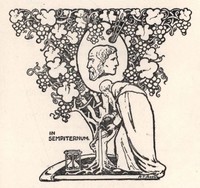| Summary |
"Leighton" by A. L. Baldry is a biographical account of the life and work of the influential British artist Sir Frederic Leighton, written in the early 20th century. This book provides an overview of Leighton's artistic development, training, and career, emphasizing the profound connection between his artistic vision and personal experiences. Through detailed analysis, it aims to unravel the complexities of his character and the impact of his works, primarily focusing on his contributions to the aesthetics of painting and decoration during his lifetime. The book delves into Leighton's upbringing, his artistic training across various European cities, and the distinctive qualities of his paintings, such as their classical influence and decorative nature. It discusses his journey to becoming a prominent figure in the British art scene, noting his innovative approach to classical themes and the enduring aesthetic values he championed. Baldry presents a mixed account of Leighton's public reception—acknowledged as brilliant but often misunderstood in terms of his deeper artistic motives—culminating in his later life while he faced personal health struggles and aspirations that remained unfulfilled at his untimely death. The narrative affirms Leighton's legacy while also addressing the challenges he encountered in gaining widespread appreciation for his unique artistic contributions. (This is an automatically generated summary.)
|

